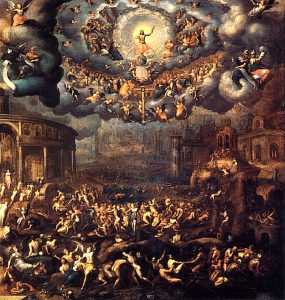Thoughts on Sunday’s Lessons for Dec. 3, 2023 (Advent 1B)

The Second Coming (1560-89), painting by Jean Cousin le Jeune (c.1522-1595), the Louvre, Paris. (Click image to enlarge.)
First Reading: Isaiah 64:1-9
One clear idea rings through the Lectionary readings as Advent begins this Sunday: God is coming. God may come quietly, quickly; God may come amid fire and upheaval. We had better be ready. In our first reading we turn toward the end of Isiah’s great book of prophecy. The people are returning home to Jerusalem from exile at last, but they must face up to a difficult reality: This is not the city they knew, but a devastated place, a ruined city on a hill with its great temple destroyed and only a remnant of defeated people remaining. “O that you would tear open the heavens and come down,” the prophet calls out, urging God to show their might, restore the people, make them new and forgive their sins.
Psalm: Psalm 80:1-7, 16-18
The selected verses of Psalm 80 echo Isaiah’s call. This anguished cry to God goes up three times: “Restore us, O God of hosts; show the light of your countenance, and we shall be saved.” The people have suffered. God’s punishment has forced them to endure their enemies’ derision and laughter. They have eaten and drunk their own tears like bread and water. Send us a messiah, the Psalmist pleads – the son of man at God’s right hand – and the people will never turn from God again.
Second Reading: 1 Corinthians 1:3-9
Paul’s first letter to the Corinthians is a deeply pastoral epistle that throughout its pages addresses many fractures in a small, passionate Christian community in a Greek seaport city. Paul begins with no hint of conflict, though. Writing in the formal style of ancient Greek correspondence, he sets the scene by greeting the people with grace and peace. He reminds them that grace has come to them through Jesus and enriched them, filling them with spiritual gifts. Because of this, Paul assures them, they will be ready, strong and blameless when Christ returns.
Gospel: Mark 13:24-37
In our first reading, we heard Isaiah’s prayer for God to come with justice after the first destruction of Jerusalem and the temple. Now, in phrases likely set down not long after the Romans had destroyed the city and the temple again, the evangelist Mark imagines Jesus coming again amid clouds, in power and glory. In an apocalyptic passage that echoes the Hebrew Bible’s Prophet Joel, Jesus foretells a time when the sun will be darkened, the moon will not give its light, and the stars will fall from the skies. This will be a tumultuous time, Jesus warns his followers, so they must watch for signs of his return: They must stay awake, ready and alert.
